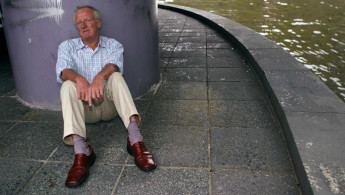Breadcrumb
Veteran Middle East journalist, columnist Robert Fisk dies
Robert Fisk covered Middle East politics for more than four decades.
2 min read
Fisk was one of the most noted journalists on the Middle East [Getty]
Middle East journalist Robert Fisk died in Ireland, his adopted home, aged 74, local media reported on Sunday, a controversial reporter who spent more than four decades reporting in the region.
The Irish Times said that Fisk died in a Dublin hospital on Sunday, after suffering a suspected stroke.
"Veteran foreign correspondent and author Robert Fisk has died after becoming unwell at his Dublin home on Friday," the Irish daily reported.
"It is understood the journalist was admitted to St Vincent's hospital where he died a short time later."
Fisk moved to Beirut in 1976, where he covered the Lebanese civil war beginning with The Times before he moved to The Independent in 1989, a newspaper he spent the remainder of his career.
Fisk covered most major events in the Middle East and was one of the few Western journalists to report from Lebanon during the civil war.
His critical stance towards the US and Israel in the region was him praise, but grew criticism for his coverage of Syria, which was deemed as biased towards Bashar Al-Assad's regime.
Fisk spent his final years as a comment writer for the newspaper, a move some deemed to be due to a lack of credibility of his sources during the Syria war.
This included his coverage of Syrian regime chemical attacks in Douma.
He also wrote two books that have been widely praised by critics, most notably "Pity The Nation", which covers his experiences during the Lebanese civil war.
Fisk was born in Kent but spent much of his life in Beirut, while he also became an Irish citizen with a home in Ireland.
Many journalist and figures from the region, particularly Syrians, had mixed feelings about Fisk's legacy.
"I had lunch with Robert Fisk as an MA student in 2005, Australia. I was awed by his bravery, resilience, writing style, and passion for the truth. Then came post-2011 Fisk who whitewashed Assad's crimes. It saddened me. I could not reconcile the two Fisks," wrote Amro Ali, a well-known academic in Lebanon.






![Anthony Blinken speech [Getty] Anthony Blinken speech [Getty]](/sites/default/files/styles/image_684x385/public/media/images/6263436E-8ACD-4D3C-9055-25A7BE79DD5A.jpg?h=d1cb525d&itok=fLHmHCRG)
 Follow the Middle East's top stories in English at The New Arab on Google News
Follow the Middle East's top stories in English at The New Arab on Google News
![Hajj Saudi Arabia [Getty]](/sites/default/files/styles/image_330x185/public/2157179630.jpeg?h=a5f2f23a&itok=kuo1G9Hw)
![French President Macron [Getty]](/sites/default/files/styles/image_330x185/public/2192150629.jpeg?h=a5f2f23a&itok=_lRlOebg)
![Gaza death toll [Getty]](/sites/default/files/styles/image_330x185/public/2192491071.jpeg?h=a5f2f23a&itok=1V9vL9X5)